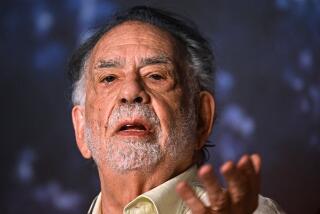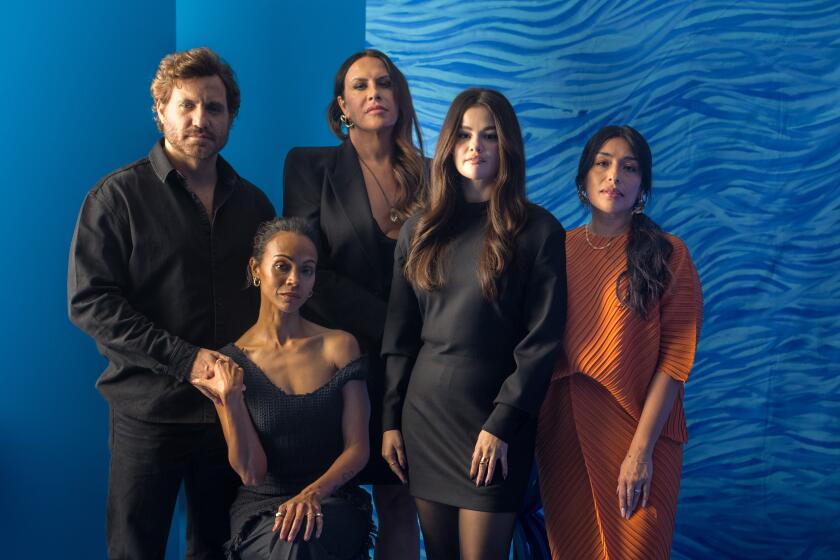Review: ‘Priscilla,’ Sofia Coppola’s best movie in years, shimmers with beauty and heartbreak
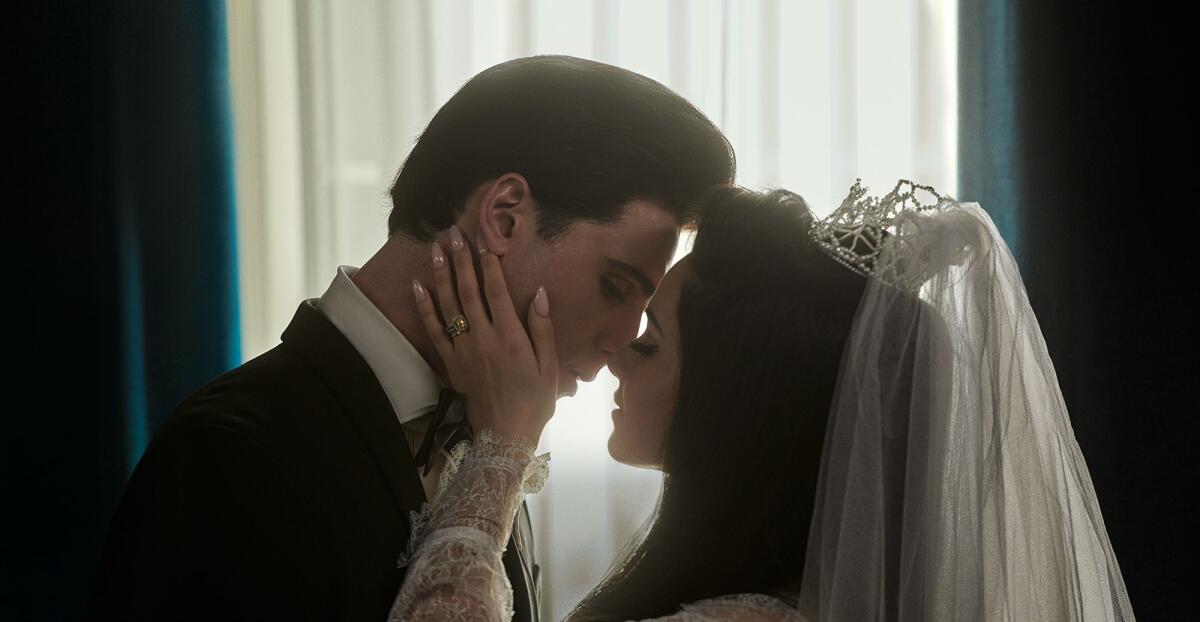
One of the first songs you hear in “Priscilla,” Sofia Coppola’s wistful dream of a movie about Priscilla Presley, is a cover of Frankie Avalon’s “Venus,” pouring from a snack bar jukebox in 1959. Coppola has always had a way with anachronistic, subtly discombobulating musical choices, but aside from the band (the French group Phoenix, fronted by the director’s husband, Thomas Mars), this particular song is period-perfect, and piped in directly from Presley’s own memories. Sitting there at the bar, she’s still just Priscilla Beaulieu (Cailee Spaeny), a shy, unassuming 14-year-old Air Force brat who’s recently moved from the States to Wiesbaden, West Germany. Suddenly a stranger approaches her and asks if she likes Elvis Presley. “Of course, who doesn’t?” she replies, not long after the song has cycled through its most salient passage: “Venus, if you will / Please send a little girl for me to thrill.”
Eerily (and a little queasily), those lyrics foreshadow an encounter that will forever change Priscilla’s life. A few nights later, she finds herself at a party thrown by Elvis himself (Jacob Elordi), who’s been transferred to Germany during his Army service and hosts regular gatherings for his fellow American expats. But something more than homesickness seems to be motivating Elvis’ immediate and persistent interest in Priscilla, which doesn’t abate when he finds out that she’s a ninth-grader (and 10 years younger than he is). “Why, you’re just a baby,” he says, to which she replies with a curt, wounded “Thanks.” He’s amused by her spunk. She’s floored and, yes, thrilled by his attention.
With exquisite patience, pointillist detail and a sadness so soft and luxuriant you can practically drape it around yourself like a mantle, “Priscilla” charts this young woman’s struggle over the next 14 years to hold on to that attention. Adapted by Coppola from “Elvis and Me,” Presley’s 1985 memoir (co-written with Sandra Harmon), this is, unsurprisingly, the story of a life lived in the shadow of one of the world’s most extraordinary entertainers. As such, it’s about the intoxication of too-young love, the pitfalls of celebrity, the ravages of addiction and, inescapably, the abuse of power. Mostly, though, it’s about disillusionment: the gradual weakening and collapse of an exquisite mirage.
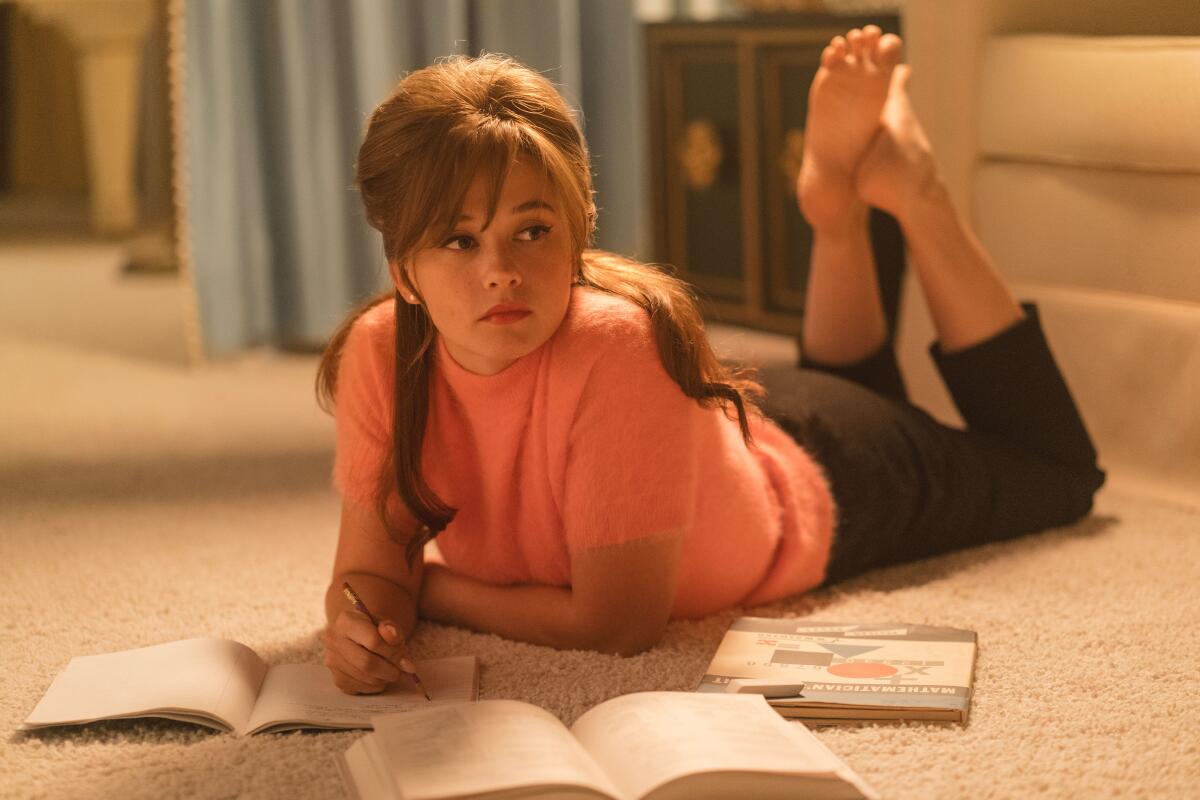
But Coppola, never one to fall back on easy, moralizing judgments — nor to disentangle sadness from joy, its natural companion — doesn’t deny or condemn that mirage’s seductive power. Nor does she take the easy route of mistaking a young woman’s naiveté for passivity or victimhood, qualities that could scarcely be more absent from Spaeny’s intensely watchful performance. Spaeny (“Mare of Easttown”), who won the Volpi Cup for best actress at the Venice International Film Festival last month, doesn’t overemphasize the young Priscilla’s disbelief at what seems to be her impossible good fortune. If she’s shocked that Elvis wants something from her — and that something isn’t sex, given his refusal to sleep with her — she nonetheless conveys an almost otherworldly self-possession.
While Baz Luhrmann’s maximalist biopic “Elvis” recently reminded us of the man’s gift for sending women around the world into screams and convulsions of erotic ecstasy, you can’t imagine Spaeny’s Priscilla giving herself over to such an impulse. For her, the gift of Elvis’ attention is like a secret too precious to be broadcast so coarsely — or indeed shared with anyone else at all. Drifting down a corridor at her German school, a world that looks even drabber and uglier after the wonders she’s seen, this Priscilla seems lost in a dream, the most private of reveries.
Elordi, for his part, gives us a rock ’n’ roll king worthy of those reveries. You’ve never seen a more towering Elvis — the actor stands five inches taller than the real deal did, making him seem even larger than life — or, at first, a more achingly vulnerable one. In a situation that’s awkward for all involved (the audience included), it’s Elordi’s soft-spoken gentility that disarms better judgment. He gets parental permission to see Priscilla again and again, winning over her strict captain father (Ari Cohen) and quietly doubting mother (Dagmara Dominczyk) with his courtly Southern manners and reassurances of honorable intent. Coppola, without passing overt judgment, trusts us to be properly appalled — but also to understand, on some level, the disorientation of being swept up in a superstar’s orbit.
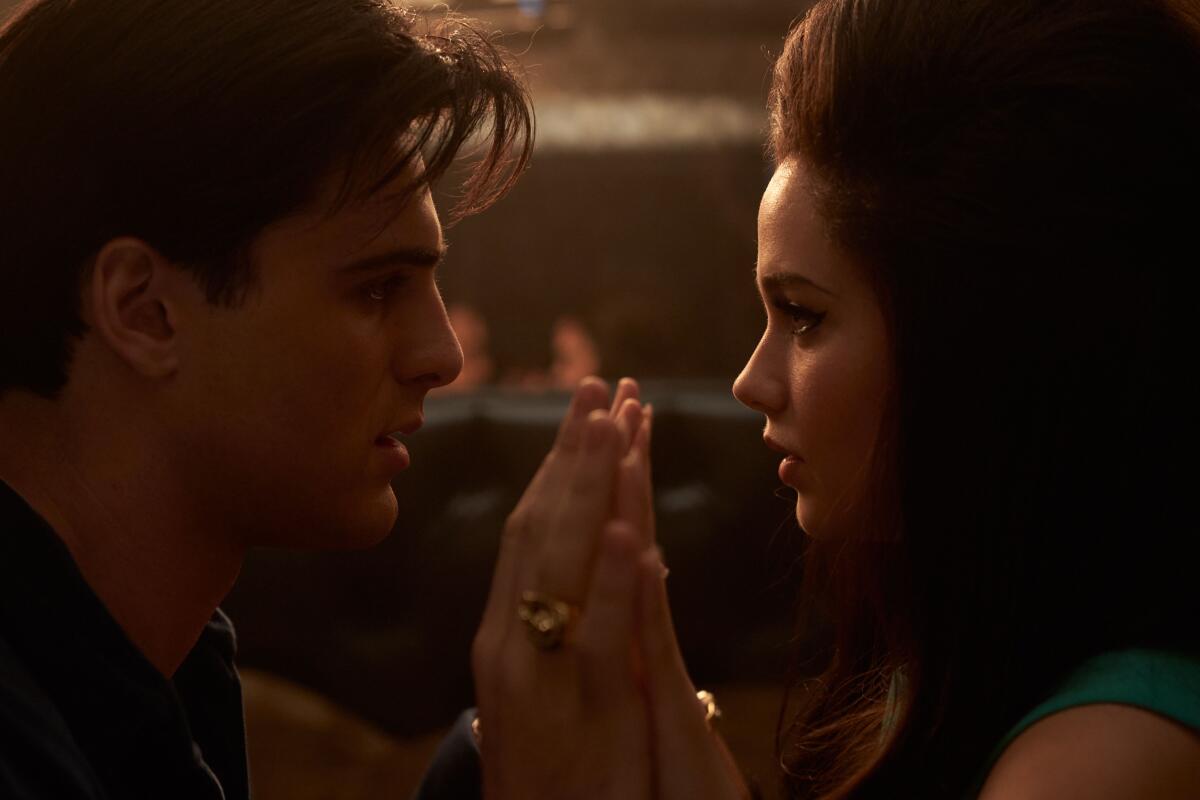
It’s hard not to get swept up alongside Priscilla, too, even as Coppola’s clear-eyed gaze keeps pulling us back. Even during this swoony quasi-courtship, the cracks in Elvis’ Prince Charming veneer are all too apparent. A year or so later, his military service ends and he returns to the U.S. and his (flailing) Hollywood movie career, vanishing for a long stretch from Priscilla’s life. “Maybe it’s time to forget about him,” her mother sensibly suggests. But Priscilla, filling her notebooks with romantic doodles even as she reads about Elvis’ on-set fling with Ann-Margret, is hopelessly far gone. And when Elvis returns to her, he does so in full and irresistible force, inviting her to come visit him at Graceland. An extended visit leads to a permanent relocation, as Priscilla’s parents agree to let her finish high school in Memphis.
The rest is history: startling, inevitable and unbearably sad. It’s also the part where “Priscilla” becomes most recognizably a Sofia Coppola movie, which is to say an extended stay in a meticulously gilded cage. And even by the standards of her past cages — the opulent 18th century Versailles of “Marie Antoinette,” the ennui-soaked West Hollywood enclave of “Somewhere” — the Graceland she shows us, bathed in the muted hues and dim shadows of Philippe LeSourd’s cinematography, is a singularly haunting prison. There’s an early, teasing and quintessentially Coppola-esque shot of Priscilla’s bare feet, her toenails freshly painted, sinking into the carpet and barely leaving an imprint. Even after this iconic piece of Tennessee real estate has become her home, Priscilla slinks through its rooms like a stranger, as quiet and unnoticed as a phantom.
When Elvis is away, which he is much of the time, the estate is as hushed as a mausoleum; when he’s home, buoyed by his rambunctious “Memphis Mafia” and doted on by his ever-present grandmother (Lynne Griffin), it’s a never-ending party. In between is the elusive truth of Elvis and Priscilla’s romance and eventual marriage, the specifics of which Coppola dramatizes with a damningly straight face. There are the pills that Elvis pops and, with increasing regularity, shares with Priscilla. There are his spiritual and intellectual aspirations, which he tries in vain to get Priscilla to share, and also his sudden eruptions of temper, some of which lead to physical violence.
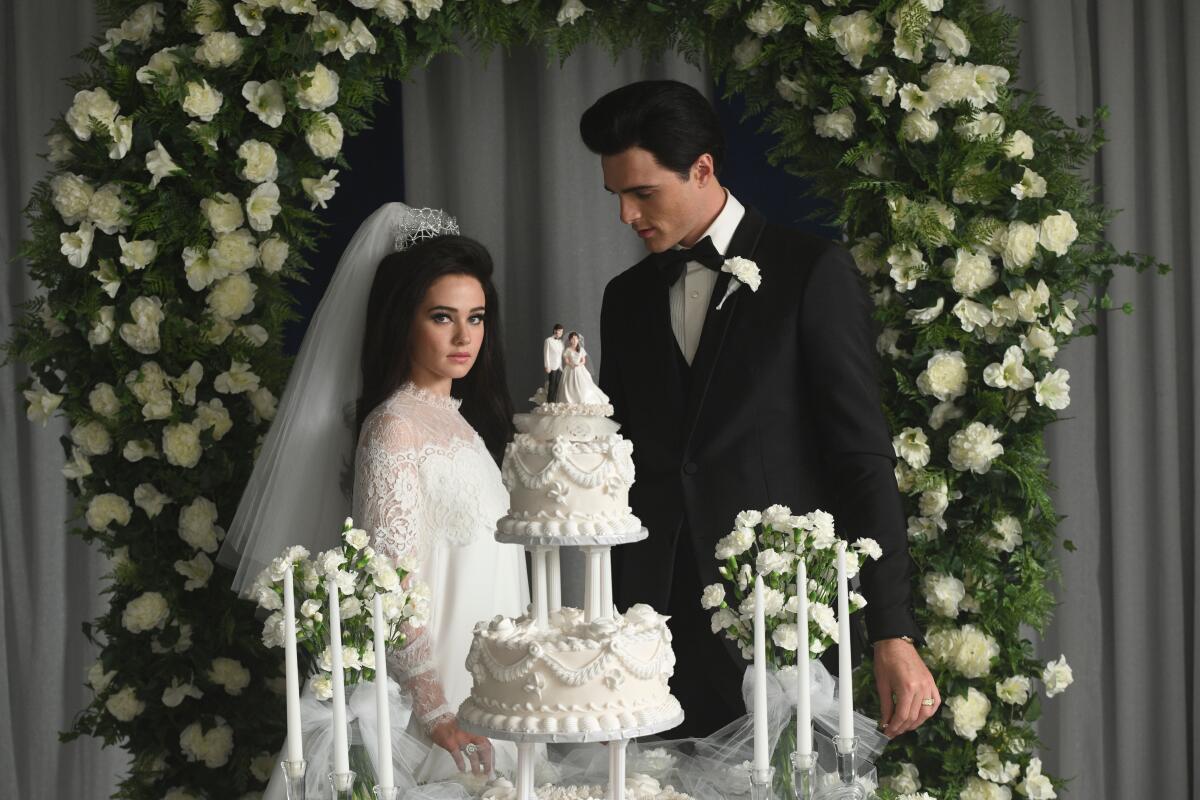
Above all there is a chilling ambiance of physical repression and psychological control, the most fascinating manifestation of which is Elvis’ refusal to have sex with Priscilla until they’re married. If you’re reminded of “Marie Antoinette,” Coppola’s earlier movie about a young woman ensconced in a long-unconsummated relationship, the difference is crystal-clear, namely that Elvis and Priscilla are obviously in love. The tragedy of that love is equally clear: Elvis, in thrall to his addictions and uncertain of who he wants to be, is too psychologically ravaged to give more than the smallest piece of himself to Priscilla. And yet the movie leaves no doubt that what these two shared, for all its wrenching imbalance of power, attention and feeling, was something neither one could resist or deny.
In tracking the contours of that love, Coppola’s filmmaking throws off a whispery new confidence. Spaeny’s Priscilla must age about 14 years in just under two hours, a process that takes place almost imperceptibly beneath a stream of black bouffant wigs and shimmery gowns — emblems of Elvis’ insistence on recasting Priscilla in his own celebrity image. (His songs, however, are conspicuously absent, apparently due to rights issues; it’s a setback that feels increasingly like a strength, a refusal to let Elvis define the movie’s parameters.) Time passes in a brisk blur of tabloid headlines, album covers and ripped calendar pages, but the world that Coppola builds for her heroine holds together with beautiful coherence, right up until the moment it’s ready to fall apart.
And fall apart it does, with a swiftness that can leave you and “Priscilla” itself feeling slightly destabilized. There is much more to Priscilla Presley’s story left untold here: motherhood (Lisa Marie appears briefly here, at different ages), her own infidelity, her future romances, her friendship with Elvis until his death in 1977, her film career, “The Naked Gun” movies. (The re-creations alone would merit a “Priscilla” sequel.) But with piercing matter-of-factness, Coppola ends this movie, her strongest in more than a decade, at just the right moment: when a dream finally dies, and the thrill is well and truly gone.
'Priscilla'
Rating: R, for drug use and some language
Running time: 1 hour, 50 minutes
Playing: Starts Oct. 27 at AMC the Grove 14, Los Angeles
More to Read
Only good movies
Get the Indie Focus newsletter, Mark Olsen's weekly guide to the world of cinema.
You may occasionally receive promotional content from the Los Angeles Times.


